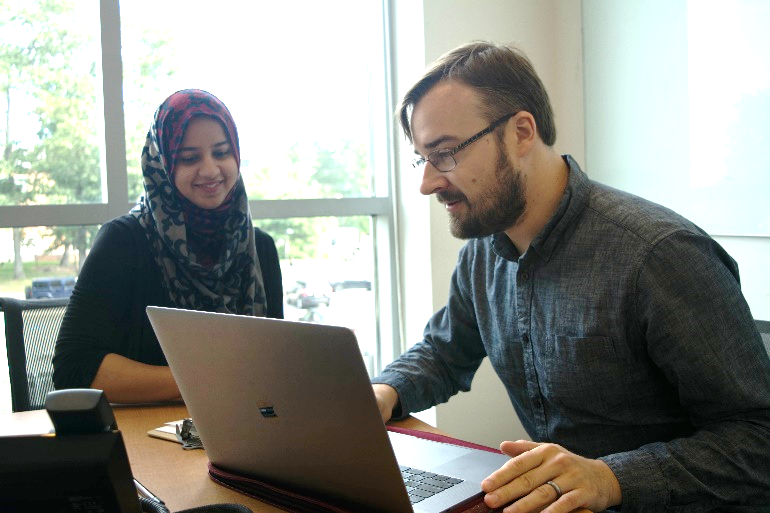
Professor Robert Patro earned the distinction this month of being one of 83 principal investigators from nine countries and four continents to receive a research grant from the Chan Zuckerberg Initiative DAF (CZI), an advised fund of the Silicon Valley Community Foundation.
The award funds Patro’s project, Efficient Tools for Quantifying and Simulating Transcript-level Abundance in Single-cell RNA-seq. This project aligns with CZI’s Human Cell Atlas effort, a global approach “to map every type of cell in the healthy human body as a resource for studies of health and disease.”
This research focuses on developing robust and computationally-efficient methods for inferring gene and transcript-group level abundances from scRNA-seq data, including developing and assessing methods for evaluating the uncertainty of these estimates. According to Patro, he will work with PhD students who are part of his Combine Lab as well as a network of collaborators to develop, implement and evaluate different quantification. Crucially, to aid in the development and evaluation of different algorithms, Patro and his team will design a simulation tool capable of generating synthetic scRNA-seq data that mimics the characteristics of experimental data and that can be used for assessment.
“I am thrilled to welcome this distinguished group of grantees to the CZI family, and I am excited about how they will support the ambitious Human Cell Atlas effort. Working together and with our team of scientists and engineers, these partners will create new ways for scientists to use information about healthy and diseased cells. Their efforts will help to accelerate progress toward our goal of curing, preventing, or managing all diseases by the end of the century,”
Priscilla Chan MD, co-founder of the Chan Zuckerberg Initiative
According to Samir Das, chair of computer science at Stony Brook University, 2018 is quite the year for Patro. “In addition to CZI recognizing the innovation and ambition in Rob’s work, earlier this year he was recognized as a National Science Foundation CAREER awardee. This recognition solidifies his role as a leader in the field of computational biology.”
The methods and tools developed by Patro and his group will be made freely available in the software tools Salmon and Alevin that are developed and maintained by the Combine Lab. Patro’s network of collaborators in this work include Professor Casey Greene’s and Arjun Raj’s labs at the University of Pennsylvania, Professor Elana Fertig’s and Loyal Geoff’s labs at Johns Hopkins University, Professor Smita Krishnaswamy’s lab at Yale University and Professor Merja Heinäniemi’s lab at the University of Eastern Finland.
Cori Bargmann, Head of Science for CZI, is excited to begin working with awardees. “These grantees include experts in experimental biology, engineering, and computational biology. Enabling them to collaborate and bring their diverse perspectives to the work is the core of our approach to advancing biomedical science,” said Bargmann.
About the Researcher
Robert Patro is an assistant professor of computer science in the College of Engineering and Applied Sciences at Stony Brook University. He earned a PhD and BS in computer science from the University of Maryland-College Park. Prior to joining Stony Brook, he was a visiting scholar as well as a Postdoctoral Research Associate at Carnegie Mellon University. Patro’s main academic interests are in the design of algorithms and data structures for processing, organizing, indexing and querying high-throughput genomics data. He is also interested in the intersection between efficient algorithms and statistical inference.
About the Chan Zuckerberg Initiative
The Chan Zuckerberg Initiative was launched in December 2015 by Mark Zuckerberg, founder and CEO of Facebook, and Priscilla Chan, a pediatrician and founder and CEO of The Primary School in East Palo Alto. The Chan Zuckerberg Initiative is a new kind of philanthropy that seeks to engineer change at scale. By pairing world-class engineering with grant-making, impact investing, policy, and advocacy work, CZI hopes to build a future for everyone. Initial areas of focus include supporting science through basic biomedical research and education through personalized learning. CZI is also exploring ways to address barriers to justice and opportunity - from criminal justice reform, to expanded access, to economic opportunity and affordable housing.
Detailed information on each of the recently funded CZI projects can be found here.
